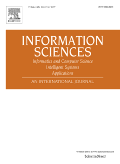Editorial Board
Coopetition bunch graphs: Competition and cooperation on COVID19 research
PR-LTTE: Link travel time estimation based on path recovery from large-scale incomplete trip data
Reversible data hiding based on high fidelity prediction scheme for reducing the number of invalid modifications
A detection method of individual fare evasion behaviours on metros based on skeleton sequence and time series
Self-adapting spiking neural P systems with refractory period and propagation delay
A time-varying distance based interval-valued functional principal component analysis method – A case study of consumer price index
Top-k team synergy problem: Capturing team synergy based on C3
A novel PROMETHEE method based on GRA-DEMATEL for PLTSs and its application in selecting renewable energies
P colonies with agent division
Fairness and accuracy in horizontal federated learning
QueryNet: Querying neural networks for lightweight specialized models
Implementing local-explainability in Gradient Boosting Trees: Feature Contribution
An exponential stabilization criterion for switched delayed interval type-2 fuzzy systems under admissible edge-dependent average dwell time mechanism
Deep asymmetric hashing with dual semantic regression and class structure quantization
Hierarchical recurrent neural networks for graph generation
REBORN: Transfer learning based social network alignment
Incremental rough reduction with stable attribute group
A business context aware decision-making approach for selecting the most appropriate sentiment analysis technique in e-marketing situations
ReCom: A deep reinforcement learning approach for semi-supervised tabular data labeling
Feature space and label space selection based on Error-correcting output codes for partial label learning
A machine learning and genetic algorithm-based method for predicting width deviation of hot-rolled strip in steel production systems
A parameter-free approach to lossless summarization of fully dynamic graphs
MTGK: Multi-source cross-network node classification via transferable graph knowledge
Convolutional attention neural network over graph structures for improving the performance of aspect-level sentiment analysis
A performance tunable CPIR-based privacy protection method for location based service
Cluster output synchronization for memristive neural networks
A review of green shop scheduling problem
Optimal consensus model-free control for multi-agent systems subject to input delays and switching topologies
Multi-view support vector ordinal regression with data uncertainty
A multistage evolutionary algorithm for many-objective optimization
A ranked solution for social media fact checking using epidemic spread modeling
Optimality of regularized least squares ranking with imperfect kernels
Evolutionary game theory in a cell: A membrane computing approach
SocialLGN: Light graph convolution network for social recommendation
Solving fully fuzzy linear system: A new solution concept
Recursive elimination current algorithms and a distributed computing scheme to accelerate wrapper feature selection
SENGR: Sentiment-Enhanced Neural Graph Recommender
A cost-sensitive temporal-spatial three-way recommendation with multi-granularity decision
Robust fault hiding approach for T–S fuzzy systems with unmeasured premise variables
On computing the similarity of trapezoidal fuzzy sets using an Automated Area Method
SLC-GAN: An automated myocardial infarction detection model based on generative adversarial networks and convolutional neural networks with single-lead electrocardiogram synthesis
Revisiting group oriented secret sharing schemes
2D eπ-map for image encryption
Dynamic event-triggered model-free adaptive control for nonlinear CPSs under aperiodic DoS attacks
Event-triggered dissipative control for 2-D switched systems
Neural generative model for clustering by separating particularity and commonality
Self-regulated bi-partitioning evolution for many-objective optimization
Error-aware Markov blanket learning for causal feature selection
Towards comprehensive approaches for the rating prediction phase in memory-based collaborative filtering recommender systems

